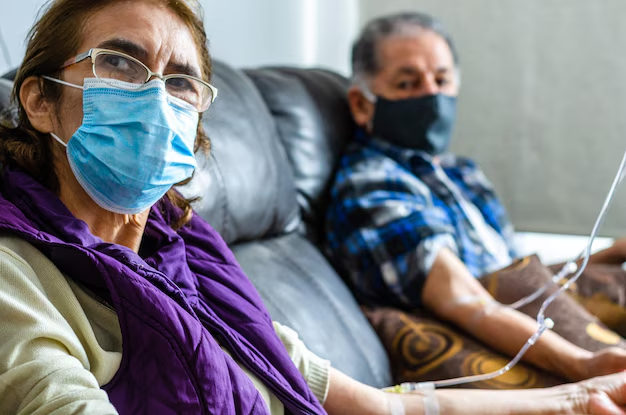Understanding Pneumonia and How It’s Treated
Coughing, fever, and difficulty breathing are symptoms that can stop anyone in their tracks. If you've been diagnosed with pneumonia or know someone who has, understanding how to manage and treat this condition is essential. Pneumonia, a common respiratory infection, can range from mild to life-threatening and knowing how to respond makes all the difference. Let's dive into what pneumonia is, its symptoms, treatment options, recovery tips, and preventive measures.
What Is Pneumonia?
Pneumonia is an infection that inflames the air sacs in one or both lungs. These air sacs may fill with fluid or pus, causing symptoms like a cough with phlegm or pus, fever, chills, and difficulty breathing.
Causes of Pneumonia
Bacteria: Often causes pneumonia in adults and can result in more serious cases. Streptococcus pneumoniae is the most common bacterial cause.
Viruses: Such as influenza and respiratory syncytial virus (RSV); more common in children.
Fungi: More often found in those with reduced immune systems.
Mycoplasma: Causes a milder form referred to as "walking pneumonia."
Common Symptoms
- Cough: Producing green, yellow, or bloody mucus.
- Fever and chills: Often accompanied by sweating.
- Shortness of breath: Occurs during normal activities or even while resting.
- Chest pain: Sharp or stabbing pain worsened by deep breaths or coughing.
- Fatigue: Persistent tiredness and low energy.
- Nausea, vomiting, or diarrhea: Especially in children.
How Pneumonia Is Diagnosed
Diagnosing pneumonia typically involves medical history review, physical examinations, and various diagnostic tests. Doctors listen to your lungs with a stethoscope and might order:
- Chest X-rays: To determine the extent and location of the infection.
- Blood tests: To identify the type of germ causing the infection and assess the overall health impact.
- Sputum tests: Analyzing mucus expelled from the lungs to pinpoint the pathogen.
- Pulse oximetry: Measures the oxygen level in your blood.
Treatment Options for Pneumonia
Medical Treatments
The treatment approach for pneumonia will depend on the cause, severity, and the patient’s general health.
Antibiotics: For bacterial pneumonia, antibiotics are the go-to treatment.
Antiviral medications: Use these for viral pneumonia, especially in cases caused by influenza strands.
Antifungal treatments: Applicable for fungal pneumonia, these address specific fungal types.
Hospitalization: Necessary for severe cases, where patients might require oxygen therapy or mechanical ventilation.
Home Remedies and Supportive Care
- Rest: Essential for recovery; ensures energy is directed towards fighting the infection.
- Hydration: Drink plenty of fluids to help thin and clear mucus.
- Humidifiers: Adding moisture to the air can soothe breathing passages and alleviate coughs.
- Over-the-counter medications: For symptoms relief such as fever and aches. Always consult with a healthcare provider before using these.
Pneumonia Recovery Tips
- Take prescribed medications: Complete the full course even if you start feeling better.
- Monitor symptoms: Keep track of any changes or worsening, and contact a healthcare professional if necessary.
- Follow-up appointments: Essential for ensuring that the infection has fully cleared.
- Healthy lifestyle: Eat nutritious foods and maintain light activities as advised by your doctor to facilitate healing.
Prevention: Lowering the Risk of Pneumonia
Vaccinations
Immunizations are critical in preventing pneumonia:
- Pneumococcal vaccines: For adults over 65 and others with specific health conditions.
- Influenza vaccine: As flu can lead to pneumonia.
- Hib vaccine: Helps protect against Haemophilus influenzae type b, a common pneumonia cause in children.
Healthy Practices
- Frequent handwashing: Removes germs and protects against respiratory infections.
- Avoid smoking: Smoking harms lung function and hampers the natural defense mechanisms against infections.
- Stay active: Regular exercise keeps your immune system strong.
- Clean environment: Regularly disinfect surfaces to reduce exposure to pneumonia-causing pathogens.
Coping with Pneumonia: Emotional and Psychological Support
Pneumonia can have emotional and psychological effects on patients. Coping mechanisms and support can include:
- Seeking support from family and friends: Emotional encouragement and assistance with daily activities are crucial.
- Professional support: Therapists or support groups can help deal with anxiety or fear related to illness and recovery.
- Mindfulness and relaxation techniques: Yoga and meditation can aid in reducing stress.
Conclusion: Moving Forward with Confidence
Understanding pneumonia and its treatment options not only empowers you but also aids in better health outcomes. Armed with knowledge about causes, symptoms, treatments, and preventive measures, you can tackle this illness with resilience and informed decision-making. Remember, staying informed and seeking professional healthcare guidance when necessary is key.
📝 Quick Reference Summary
- 🔬 Causes of Pneumonia: Bacteria, viruses, fungi, mycoplasma.
- 📊 Symptoms: Cough, fever, chills, chest pain, fatigue.
- 🩺 Diagnosis Tools: Chest X-ray, blood/sputum tests, pulse oximetry.
- 💊 Treatments:
- Antibiotics for bacteria.
- Antiviral/antifungal meds for viruses and fungi.
- 🏠 Home Care: Rest, hydration, humidifiers, OTC medications.
- 💉 Prevention: Vaccinations, good hygiene, no smoking.
- ✔️ Key Tips: Monitor symptoms, follow-up with doctors, maintain a healthy lifestyle.
Understanding these steps and measures places you in a strong position to manage pneumonia effectively. Take action, stay healthy, and breathe easy! 🌬️

Related Articles
- a Typical Pneumonia
- Can a Cold Turn Into Pneumonia
- Can a Sinus Infection Turn Into Pneumonia
- Can Amoxicillin Cure Pneumonia
- Can Amoxicillin Treat Pneumonia
- Can Baby Oil Cause Pneumonia
- Can Bronchitis Turn Into Pneumonia
- Can Covid Turn Into Pneumonia
- Can Doxycycline Treat Pneumonia
- Can Flu Turn Into Pneumonia
